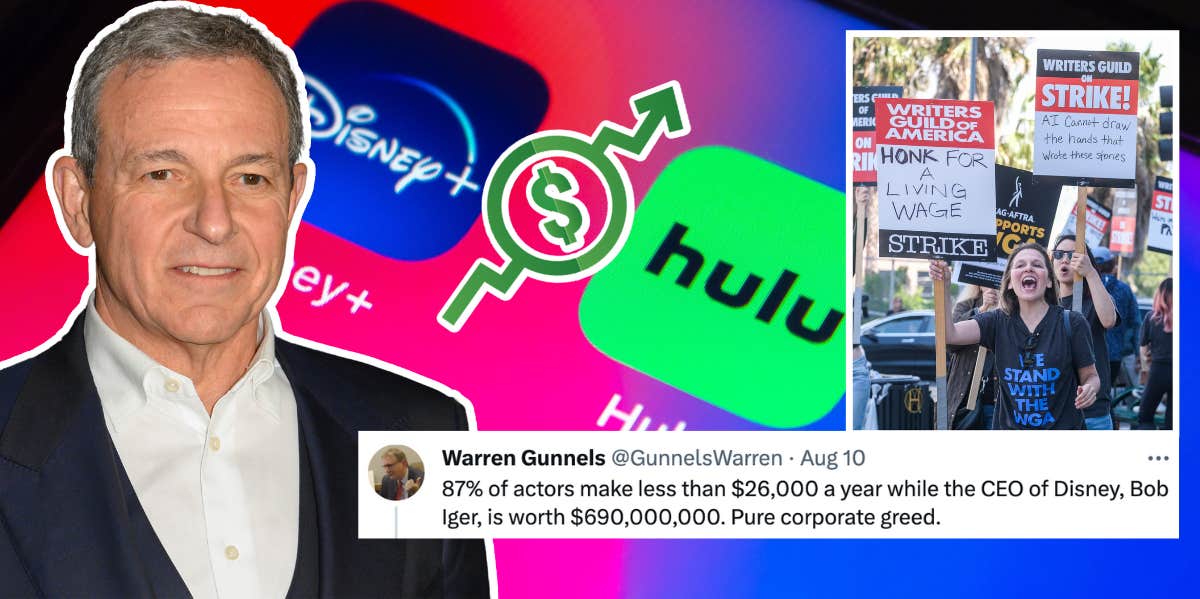Disney Sparks Backlash For Hiking Prices While Paying CEO $25 Million & Claiming It Can't Afford To Pay Striking Actors & Writers — 'Pure Corporate Greed'
Many criticized Disney CEO Bob Iger for raising prices on consumers while being worth $690,000,000.
 Koshiro K, Silvia Elizabeth Pangaro, 200dgr, Ringo Chiu / Shutterstock.com; @GunnelsWarren / Twitter; Canva Pro
Koshiro K, Silvia Elizabeth Pangaro, 200dgr, Ringo Chiu / Shutterstock.com; @GunnelsWarren / Twitter; Canva Pro Disney hasn't exactly been developing a great reputation recently among those who support the ongoing strikes by actors' union SAG-AFTRA and writers' union WGA. But the company's recent decision to up its prices has made people even angrier.
The news of Disney hiking prices on Disney+ and Hulu while paying its CEO Bob Iger $25 million has sparked angry backlash.
Disney recently announced that it will be upping the ad-free subscription prices to its Disney+ and Hulu streaming platforms by $3 each in the coming months, taking Disney+ from $10.99 to $13.99 and Hulu from $14.99 to a staggering $17.99 beginning in October.
The changes come as Disney's third-quarter earnings report showed a decline in revenue in every part of the company except for theme parks. CEO Bob Iger said that the price hike is meant to compel people toward its ad-supported option, as subscriptions overall have fallen and Disney+ has yet to turn a profit.
Iger stopped short of blaming any of these fiscal problems on the ongoing strikes by SAG-AFTRA and the WGA, who as explained below, are fighting for fair pay and residuals and against studios' and streamers' plans to replace them entirely with AI.
But he did call the strike activity "frankly, very disruptive" in an interview last month in which he claimed to have "deep respect" for “the creative community [of] actors, writers, animators, directors, and producers." This is at complete odds with what Iger has previously said about the strikes, however.
Many find Disney hiking prices while refusing to fairly pay actors and writers and paying Iger exorbitant sums of money to be indefensible.
According to Forbes, Bog Iger's net worth is approximately $690,000,000 as of 2019 — and that's before the $100 million he's earned in the four years since. His holding that stratospheric level of wealth while openly admitting to trying to gouge customers with new price hikes has infuriated many people online.
Several people have pointed out that while Iger makes $25 million a year, the vast majority — nearly 87% — of actors don't even earn enough to make the $26,400 per year threshold to qualify for SAG-AFTRA's health insurance.
Meanwhile, Disney and other enormous entertainment companies like it have made frankly shocking demands of actors and writers, including proposals that would allow them to use writers' work and actors' faces in perpetuity via Artificial Intelligence technology for a one-time payment.
Contrary to popular belief, being an actor or writer in Hollywood is a working-class job at best for all but the luckiest few household names, with even many household names themselves routinely receiving residual checks amounting to less than a dollar.
Studio and streamer heads like Bob Iger, however, claim they must raise prices and cannot afford to pay actors because of the ways the entertainment industry has changed.
The entertainment industry is struggling to turn the record profits it used to — or in some cases, any profit at all, amid the changes that technology and the pandemic have wrought on its business.
But it's impossible not to notice certain details that poke holes in Hollywood CEOs' claims, like Iger calling actors' and writers' demands to be paid fairly and not exploited in perpetuity by AI "not realistic" while drawing a $25 million salary — and saying so in an interview filmed in the ultra-elite resort town of Sun Valley, Idaho, no less.
Then there's the anonymous studio executive who openly admitted to Hollywood news site Deadline that studios' and streamers' goal "is to allow [the SAG-AFTRA and WGA strikes] to drag on until union members start losing their apartments and losing their houses." That vindictive ploy is apparently working — actor Billy Porter recently said he plans to put his house up for sale due to the lack of work.
Moves like these have struck many as being motivated by more than just worries about the economic headwinds of the entertainment industry, like vengeance and good old-fashioned corporate greed.
Now, in Disney's case, it seems Iger plans to pass his company's financial problems onto consumers, too. Never mind that Disney's company-wide subscriber-loss problems could largely be fixed by simply agreeing to fairly pay actors and writers and getting the lights turned back on in Hollywood. But of course, that would probably require him to take a pay cut on his $25 million salary. Heaven forbid.
John Sundholm is a news and entertainment writer who covers pop culture, social justice and human interest topics.

